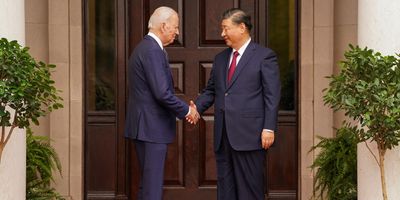Slide to the right.
Slide to the left.
And … pivot.
The diplomatic dance, dubbed “the pivot” by President Barack Obama back in 2011, is all the rage again in San Francisco, where 21 countries have gathered for the Asia-Pacific Economic Cooperation forum (APEC), and this year everyone is watching one dysfunctional couple on the dance floor: Biden and Xi.
The original Obama pivot was about increasing US influence in the Asia Pacific — read: pushing back on growing Chinese influence, military might, and Beijing’s Belt and Road Initiative – and it also meant pivoting away from places like the Middle East. So, choreographically speaking, it was a step from the Middle East to a bigger step to the Far East, as it were, and it caused friction with China. But the steps are more complicated today.
With the Russia-Ukraine war and the Israel-Hamas war raging, the US can’t just pivot away from its old stomping grounds, and yet it can’t pivot away from China either. China is similarly stuck. It’s suffering from slow growth and wants to make sure the world doesn’t descend into chaotic wars that might screw up its export markets, so it also needs to start dancing with the US again.
That’s why Chinese President Xi Jinping slid on over to San Francisco to meet with President Joe Biden for the second time. They have got to start dancing again. What is the metric of success here? It’s a low bar. Open up lines of communication. Put a floor under the deteriorating relationship. Avoid a war in Taiwan. Get back to business.
On the plus side, they reestablished military-to-military communications, which is important in a world where Chinese planes and ships are dangerously buzzing US and other NATO military assets in international waters near Taiwan. A bad accident could trigger a nightmare scenario, so a direct line matters. And they made progress on stopping the deadly fentanyl export problem.
But they didn’t get much done on rules around AI, semiconductor exports, or efforts to help stop the war in the Middle East by leaning on Iran. And Taiwan remains a festering diplomatic wound. So this ain’t no thaw. Oh, and, Biden called Xi a “dictator” immediately after their sit-down, so …
Still, the fact that they met and talked is a huge win.
An even bigger sign of warming relations came not from the lead dancer but the chorus line: Top US CEOs from companies like Apple and BlackRock gave Xi a warm round of applause and ate with him while Xi lapped it up. And why shouldn’t he? Xi, after all, is desperate to boost foreign direct investment, which is in its worst shape in 25 years. Show Xi the money.
If nothing else, the summit showed that the economic links between the two countries — ChiMerica — are too critical to toss away. So Biden gets a small win here.
Now, let’s pivot to Canada, a much lonelier figure on the dance floor.
Justin Trudeau has terrible relations with China and is not meeting with Xi at the summit, which means his Indo-Pacific strategy is really in shambles. It's not entirely his fault. China has kidnapped Canadians and interfered with elections, according to the government. Not exactly a great incentive to warm things up. Still, Canada can't ignore China.
I spoke with a senior source from the prime minister’s office who would not say much about what they wanted to accomplish at APEC with China, which is the main game here. All I got was a short note saying, “We need to engage where we need to, on issues like climate, and challenge where we have to. Our focus is continuing to deepen relations and trade, and trade is up 22% with APEC members.”
OK, but trade with that region is up globally, and it doesn't address the key question: What leverage does Canada have with China?
“Canada lacks credibility in the Indo-Pacific region, where, despite its new Indo-Pacific strategy and membership of the CPTPP [Comprehensive and Progressive Agreement for Trans-Pacific Partnership], it is seen as insufficiently and inconsistently engaged,” my colleague Graeme Thompson told me. “In the context of the geopolitical competition between the US and China, Beijing sees Ottawa as petulant and weak. The comparison with Australia, which is a serious military power for its size with a real, sustained, and long-term diplomatic and strategic focus on the region, is illuminating — and not flattering to Canada.”
The Australian PM, meanwhile, recently made a visit to China to meet Xi — this despite taking a very hawkish stance and upping its military profile with submarines and alliances like the Quad. And yet, here they are, warming the wires with China. Why? As my colleague says, Australia has paid its military dues in the region, and Canada has not.
In a world of multiple crises, there is no room for single pivots or isolating superpowers. And you can't hold a grudge. That is the reality. There has to be a united democratic front that presses bad actors, rogue actors, and superpowers that are a threat – China being one — to play by the international rules of trade and justice. That club is expensive to join and requires muscling up. That's the Aussie model, and the US likes it. So does the UK.
Biden and the US are signaling that they are pivoting back to the big dance with China. Meanwhile, Canada looks like it is still pivoting away — does that mean Trudeau has had his last dance with China?
